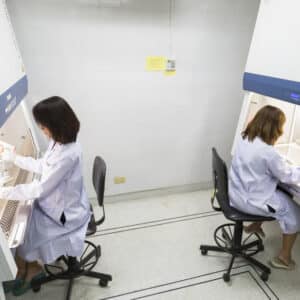Engineering is an area with multiple strands, each of which is united to the others by a shared commitment to innovation. After all, the discipline, by its very nature, must constantly evolve as its main purpose is to overcome the challenges posed across a range of areas – from computing and software to food and sustainability.
This forms part of the reason why, despite the previous recession, engineers have always been needed and employed. Engineering is necessary in the modern world; its importance is therefore set to endure, and even flourish – a sentiment reflected by the sustained investment activity in Ireland by major international companies over the last few years.
Microelectronic Engineering
This is particularly true of microelectronic engineering, which has made assured progress in Ireland in recent years and includes companies such as Intel, ZMDI and Xilinx among its growing list of overseas investors. While the sector is already an excellent economic performer – employing over 8, 000 people and contributing €9 billion per year to the Irish economy – there is tangible evidence to suggest that further growth is highly likely.
For instance, recent research by the industry group Midas suggests that the sector will create an average of 200 jobs annually for engineering graduates. Supporting this projection are announcements such as the EU’s decisions to fund the development of an eco-friendly chip by a consortium including UCC staff, along with further financial backing for a major project in broadband infrastructure (known as ‘DISCUS’) which is headquartered at Trinity College Dublin. Even greater investment can come from Intel, whose developed a $4 billion chip fabrication plant in Kildare. The creation of such a major facility generated jobs not only for electrical engineers, but for those in construction too: it is estimated that developing the plant has created employment for 3, 500 construction workers.
Projected Growth
Such growth requires a continuous supply of well-trained graduates. Unfortunately, even with the numerous postgraduate Engineering courses available to students still means there’s a huge skills deficit. (Note: Postgraduate study is not just a wise move in terms of planning for future career prospects; it is also a necessity for anyone who wants to work as a chartered engineer from 2013 onwards – as decreed by Engineers Ireland. )
Aside from the wider aim of career goals, the main importance of postgraduate education in engineering is to enhance one’s skill set and level of expertise. Ongoing professional development is essential in a technology-led profession such as engineering.
Course Advice
Some general advice for students is that they should consider enrolling on a wide-ranging engineering programme unless they are certain about the specific branch of engineering they wish to pursue (for instance, biomedical or biopharmaceutical engineering). Mechanical Engineering courses are often broad in scope and the area offers one of the most stable areas in terms of graduate employment. Programmes such as those offered at UCD and CIT are delivered through a combination of individual research, lab work, tutorials and work experience. Also, because students can generally tailor the programme (through module selection) to suit their personal tastes, they also have the chance to identify a topic that they may wish to explore further in an ensuing research programme. The resulting combination of general and specific skills allows graduates to secure employment in manufacturing, biomedical, energy and building services engineering, with further academic research being another available option.
In terms of more specific study options, postgraduate programmes in Electronic Engineering are widespread across Irish ITs and universities, with courses on offer from DIT, UCD, UL, NUI Galway and DCU, among others – yet further testimony to the sector’s noteworthy potential for prosperity. Maynooth University also provides a conversion course option. Its Master of Engineering degree (one year full time or two years part time) is geared towards engineering graduates who wish to update their knowledge of cutting-edge technology. Among the subjects taught are Optimisation Theory and Applied Computing for Engineers. Applicants for all such courses are required to have at least a 2. 2 honours primary degree in a cognate discipline.
Other Disciplines
Also popular are courses in Chemical Engineering. These are ordinarily designed to appeal to individuals with a science or engineering background who wish to develop or change their career towards the pharmaceutical or process industries. Offerings such as the University of Limerick’s GDip in Chemical Engineering (one year full time) have been specifically developed with industry in Ireland in mind – often in consultation with chemical and pharmaceutical companies. UL’s programme includes a series of one-day plant visits that give students a chance to tour chemical processing facilities and to interact with chemical engineering professionals. While candidates are typically expected to possess a second-class honours degree in a relevant scientific discipline, applications from graduates with relevant work experience are also invited.












Comments